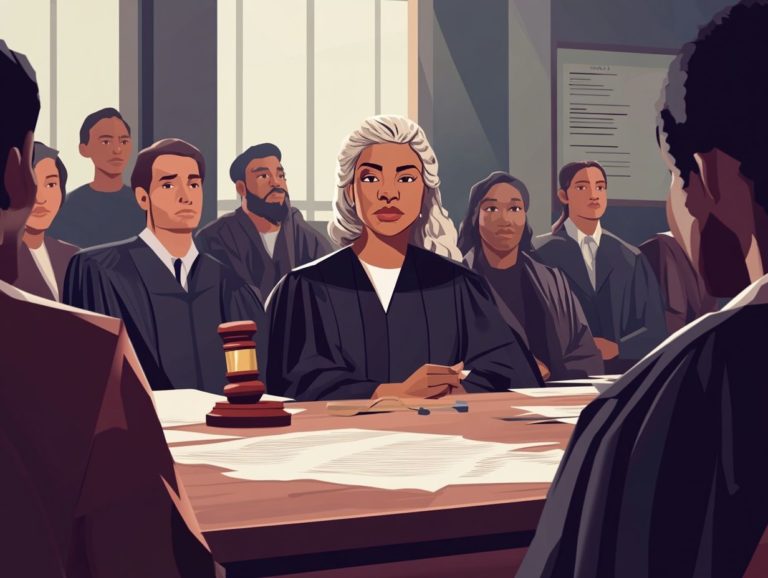Understanding the Right to Remain Silent
The Right to Remain Silent is a cornerstone of legal protection. It is essential for safeguarding individuals during encounters with law enforcement.
This principle includes its definition, legal basis, and historical development, showcasing landmark cases that underscore its significance.
You will also look at real-life situations where you can use this right, along with exceptions that may apply and the consequences of not exercising it.
Crucial tips for protecting your rights during police interrogations are included. Understanding this right is vital for anyone navigating the complexities of the legal landscape.
Contents
- Key Takeaways:
- What is the Right to Remain Silent?
- History and Evolution of the Right
- When and How to Invoke the Right to Remain Silent
- Exceptions to the Right to Remain Silent
- Consequences of Not Exercising the Right to Remain Silent
- Protecting Your Rights During Police Interrogation
- Frequently Asked Questions
- What is the right to remain silent?
- Where does the right to remain silent come from?
- When can I exercise my right to remain silent?
- Do I have to explicitly say that I am invoking my right to remain silent?
- What are the consequences of not exercising my right to remain silent?
- Can my silence be used against me in court?
Key Takeaways:

1. The right to remain silent is a fundamental legal principle that allows individuals to refuse to answer questions in certain situations.
2. The right to remain silent has a long history and has been established through various landmark legal cases.
3. It is important to understand when and how to exercise the right to remain silent to protect yourself during police interrogation.
What is the Right to Remain Silent?
The right to remain silent is a crucial legal safeguard rooted in the Fifth Amendment of the United States Constitution. It grants you the privilege to refrain from answering questions during police interrogations, protecting you from self-incrimination, which means being forced to say something that could make you look guilty.
Often referred to as Miranda rights, this protection mandates that law enforcement inform you of your rights before any custodial interrogation takes place. This ensures that you are fully aware of your legal protections and the potential implications of your statements.
Definition and Legal Basis
The legal foundation for your right to remain silent primarily comes from the Fifth Amendment, which protects you from being compelled to testify against yourself in criminal cases. This Amendment ensures that you are aware of your rights during custodial interrogation.
The Miranda rights inform you that you have the right to remain silent and the right to an attorney, clearly stating that anything you say can be used against you in court.
This framework emphasizes the importance of seeking legal advice in high-pressure situations. It also establishes courtroom procedures that protect these rights. Courts are responsible for upholding these protections, ensuring that any confession or statement you make is voluntary and that you understand its implications. This enhances the integrity of the judicial process.
History and Evolution of the Right
The history and evolution of the right to remain silent have been shaped by landmark Supreme Court decisions. The pivotal case of Miranda v. Arizona established the crucial requirement to inform suspects of their rights during custodial interrogation.
This decision has profoundly impacted legal protections within the justice system, safeguarding individuals from self-incrimination and ensuring a fairer process.
Origins and Landmark Cases
The origins of your right to remain silent can be traced back to pivotal legal precedents, particularly the Supreme Court case Miranda v. Arizona. This case emerged from a civil rights violation that revealed the need to protect suspects’ rights during police interrogations.
In this landmark ruling, the Court established that anyone in custody must be informed of their rights to remain silent and to have legal counsel present during questioning. This decision addressed the coercive tactics often employed by law enforcement, highlighting the importance of clearly communicating rights to ensure fair treatment.
Following Miranda, additional significant cases, such as Edwards v. Arizona and Salinas v. Texas, further refined the understanding and application of the right to remain silent. These rulings reinforced its essential role in safeguarding due process within the criminal justice system, emphasizing just how vital these protections are for individuals like you.
Stay informed and confident about your rights!
When and How to Invoke the Right to Remain Silent

Understanding when and how to invoke your right to remain silent is essential if you find yourself facing police interrogation. This knowledge gives you the power to protect yourself from the risk of incriminating yourself and ensures that your legal rights are upheld during what can be a highly intimidating process.
Being informed gives you leverage in navigating this challenging situation with confidence.
Scenarios and Best Practices
There are certain situations where invoking Miranda rights becomes absolutely essential. For instance, during police questioning, if you sense that your statements might be used against you in court, this is the moment to assert those rights.
If you are detained without formal charges, it s crucial to invoke this right. Anything you say in these circumstances could easily be misinterpreted later.
When confronted with intense interrogations, it s easy to feel pressured to answer, which can jeopardize your defense. It’s vital for you to clearly express your wish to remain silent ideally by stating, “I wish to speak to a lawyer.” Saying this will make law enforcement stop questioning you.
Not having a lawyer can hurt your case in any future legal proceedings, which could lead to serious consequences that may affect your future significantly.
Exceptions to the Right to Remain Silent
The right to remain silent is an essential legal safeguard, yet there are specific exceptions where this right may not hold.
These exceptions often hinge on the nature of the police encounter and the legal obligations placed upon the suspect.
Instances Where the Right May Not Apply
There are circumstances in legal contexts where the right to remain silent may not fully apply, particularly during specific custodial interrogations that carry particular legal implications requiring you to speak up while in custody.
For instance, if law enforcement is engaged in a time-sensitive investigation concerning a serious public safety threat, like a potential terrorist act, the demand for you to disclose information might outweigh your right to remain silent.
Similarly, in the context of an ongoing police investigation, certain statements you make as a suspect could be crucial in preventing imminent harm to others, allowing officers to legally bypass that right.
In these situations, the methods and strategies employed by law enforcement can greatly affect the nature and reliability of any statements gathered, potentially leading to coerced admissions or unreliable confessions. This, in turn, could significantly impact the fairness of your legal proceedings.
Consequences of Not Exercising the Right to Remain Silent
If you don’t use your right to remain silent, you could face serious consequences. Neglecting to exercise your right during a police interrogation can result in significant legal repercussions.
This misstep may expose you to the risk of a guilty verdict based on incriminating evidence that could have easily been sidestepped.
Possible Legal Ramifications

Not exercising your right to remain silent can lead to serious legal consequences, as anything you say may be used against you in court, potentially resulting in convictions.
During police interrogations, the pressure to respond can inadvertently push you to confess or reveal details that might be misinterpreted or twisted. Such statements can become crucial evidence in court, often influencing a jury’s perception and highlighting biases that can complicate your defense.
It s essential to seek legal advice before engaging with law enforcement; an attorney can navigate you through the complex web of legal rights, ensuring that you make informed choices that protect your interests.
In a legal context where every word counts, having professional support can significantly reduce the risks associated with self-incriminating conversations.
Protecting Your Rights During Police Interrogation
Protecting your rights during a police interrogation is crucial. It ensures that you are not pressured into making statements that could lead to self-incrimination, thereby safeguarding your legal protections under the Constitution.
Know your rights! Always speak to a lawyer before talking to police.
Tips for Asserting and Protecting Your Rights
To protect your rights during a police interrogation, you must clearly state your right to remain silent and seek legal counsel. Verbally express your decision to stay silent and repeat it if you’re pressured.
Staying calm is crucial. Any signs of agitation might lead officers to ask more questions.
The way law enforcement handles your situation greatly affects how your rights are honored. By being assertive and calm, you can discourage aggressive questioning.
It’s about striking a balance that protects your rights and may lead to better legal outcomes.
Frequently Asked Questions
What is the right to remain silent?
The right to remain silent means you can refuse to answer questions that might incriminate you during legal proceedings.
Where does the right to remain silent come from?

This right is based on the Fifth Amendment of the United States Constitution. It ensures that no one can be forced to testify against themselves in a criminal case.
When can I exercise my right to remain silent?
You can use your right to remain silent at any time during a police investigation, including questioning, arrest, and trial.
Do I have to explicitly say that I am invoking my right to remain silent?
Yes, you must clearly state that you are choosing to remain silent. You could say, “I am exercising my right to remain silent.”
What are the consequences of not exercising my right to remain silent?
If you answer questions, anything you say can be used against you in court. Always consult a lawyer before deciding whether to speak.
Can my silence be used against me in court?
No, your silence cannot be used against you in court. The Fifth Amendment protects you from self-incrimination, so your choice to remain silent is not evidence of guilt.






